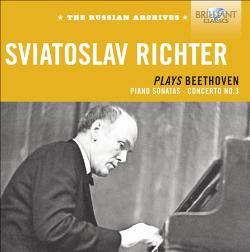In my review of a five-disc Brilliant Classics boxed set featuring Sviatoslav Richter playing sonatas by Liszt, Schubert, and Beethoven (http://www.classicstoday.com/review/review-10863/) I mentioned that many of the performances were appearing for the first time in general circulation. I also compared them to other, possibly better known Richter versions of the same works. The present three-disc collection offers the earlier set’s Beethoven sonatas, along with what I believe to be the earliest existing recording of Richter in the same composer’s Third Piano Concerto, first released as part of Brilliant Classics’ Richter Concerto Edition. Its unusually clear sound quality comes as a surprise, given the vile, cramped sonics we often get from Soviet concerto recordings of similar vintage, although loud climaxes tend to splatter. In essence, the interpretation is a less polished version of the emphatic, slightly square Third Concerto that Richter and conductor Kurt Sanderling recorded in 1962 for DG with the Vienna Symphony Orchestra in infinitely better sound.
As for the sonatas, they largely confirm how Richter was more consistent than his ardent fans tend to claim, meaning that the 1965 Op. 90 sonata from Moscow does not strikingly differ from published Prague, New York, and Salzburg live versions recorded earlier that year. On the other hand, it is a freer and more flexible reading in relation to the stricter, starker outlines of its 1970 studio counterpart. The C major (Op. 2 No. 3), E-flat major (Op. 7), and C minor (Op. 111) come from a particularly inspired January 12, 1975 recital; what a whirlwind tempo for Op. 111’s first-movement Allegro con brio ed appassionato! The close-up, flinty sound quality benefits from more reverberation and depth here than in a drier Music and Arts transfer.
A lean, nimble, and marvelously controlled Op. 101 from 1965 is marred by poor tape transfer on the first chord of the Scherzo movement; a private CD edition of this performance on the Russian Masters label (minus the first movement) avoids this glitch and boasts fuller sound. While Op. 31 No. 2’s outer movements stress lyricism and finesse over brio, Richter miraculously holds on to the reins as he sustains a near-breakneck pace for Op. 31 No. 3’s Presto con fuoco finale. Lastly, a January 1972 Op. 109 sonata provides a suppler, more fluid and poetic corrective to Richter’s heavier October 1991 (Philips) and October 1992 (Live Classics) traversals. Given Brilliant Classics’ super-budget price tag, I’d still spring for the aforementioned five-disc set; but if you only want Richter’s Beethoven and cannot live without his 1952 Third Concerto, then by all means acquire this release.
































